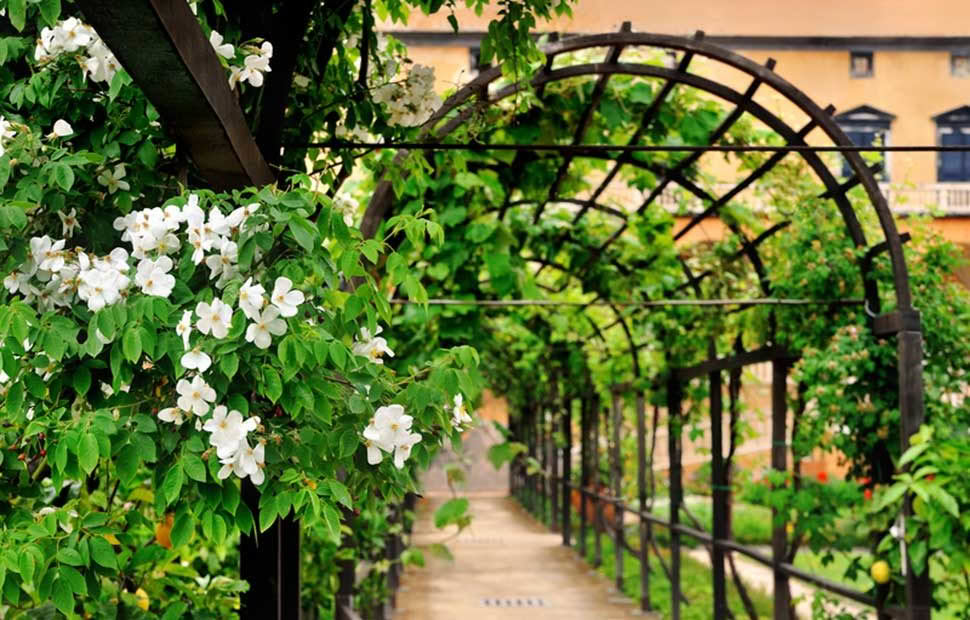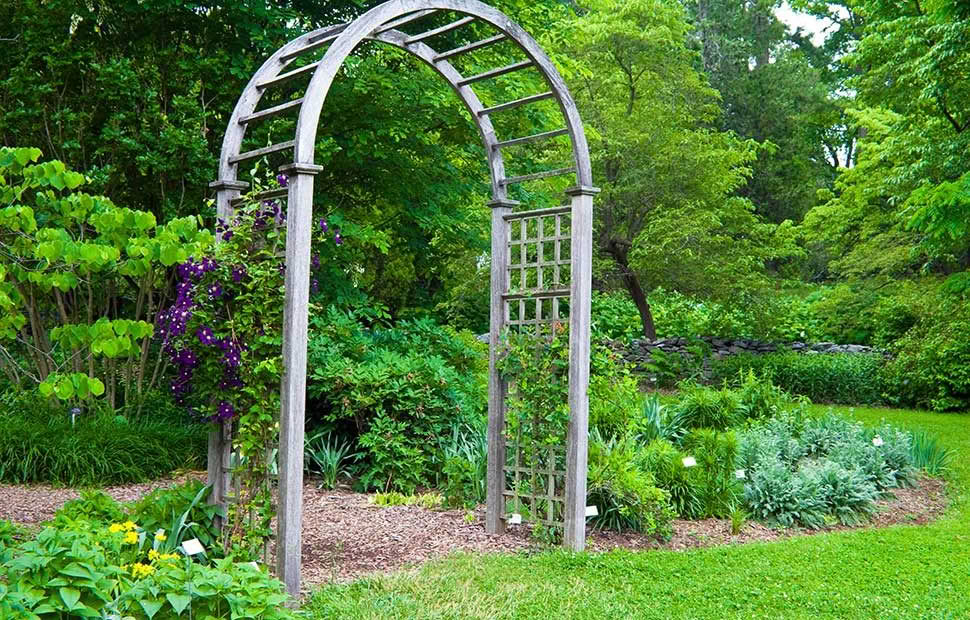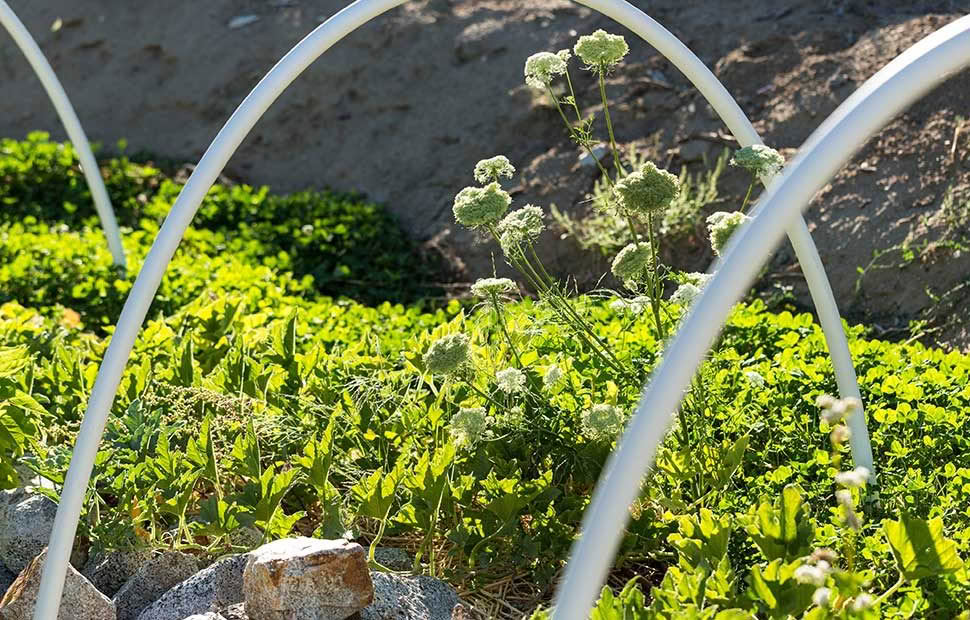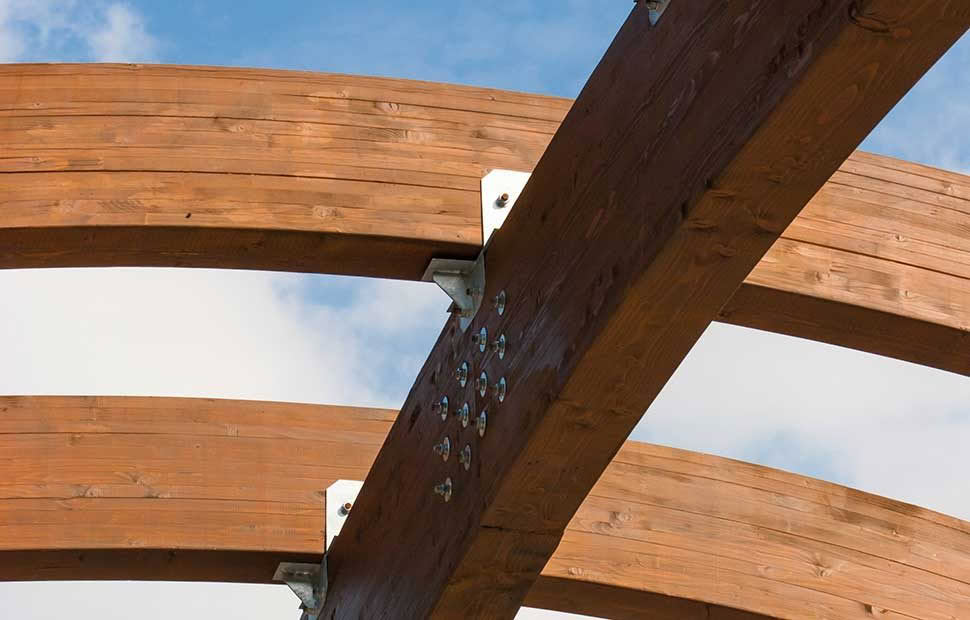Jane Wrigglesworth: A guide to garden arches

These versatile structures not only add a touch of elegance, but also provide a framework for climbing plants.
Words: Jane Wrigglesworth
Gardens are not just spaces filled with plants. They are places of beauty, tranquillity and purpose – such as growing fruit and vegetables for the dinner table.
One way to elevate the aesthetic appeal and functionality of your garden is by incorporating garden arches. These versatile structures not only add a touch of elegance, but also provide a framework for climbing plants. Whether opting for a ready-made commercially available arch or engaging in a do-it-yourself endeavour utilising eco-friendly recycled materials, understanding the distinct features of various garden arch types will guide you in choosing the perfect addition to elevate the aesthetics of your outdoor haven.
METAL GARDEN ARCHES
Pros
Durability: Metal arches, particularly those made from materials like galvanised iron or steel, are known for their durability and longevity. They can withstand various weather conditions, including rain and snow, without deteriorating quickly. They are sturdy too, able to support the weight of heavy climbing plants (unless you purchase one of those cheap, flimsy options).
Low Maintenance: Metal arches do not require regular staining, painting, or sealing to maintain their structural integrity.
Versatility in Design: Metal allows for intricate and decorative designs, providing a wide range of styles to choose from, including both traditional and modern options.
Cons
Cost: Aside from those cheaper options, metal arches can be more expensive than arches made from other materials, especially if they are crafted from high-quality metals.
Heat Absorption: In warmer areas, metal arches can absorb and retain heat, potentially making them scorching hot to touch during peak sunlight hours. There is a possibility they might scorch delicate plant leaves too.
Rust: While many metal arches are treated to resist rust, over time they may still be susceptible to corrosion, especially if the protective coating is damaged or compromised.
WOODEN GARDEN ARCHES

Pros
Aesthetics: Wood is perfect for the DIYer and arches made from this material have a natural and rustic charm that can enhance the overall aesthetics of your garden. They can complement various garden styles, from traditional to contemporary. You can paint or stain the wood to match your garden’s colour scheme or let it weather naturally for a more organic look. Wooden arches tend to blend seamlessly with the natural elements of a garden and can create a sense of harmony with the surrounding greenery.
Good for Coastal Areas: Timber holds up well on coastal sites where structures are exposed to the corrosive effects of sea salt and sand.
Cons
Regular Maintenance: Timber requires regular maintenance to prevent deterioration from natural weather conditions. This may include staining or sealing the wood, as well as addressing issues like rot or warping. Some woods are more susceptible to decay and damage over time. (See Hardwoods vs Softwoods below.)
Hardwoods vs Softwoods
Hardwoods are (usually) deciduous trees (they lose their leaves in winter), with broad leaves. They include oak and kwila, and our native species such as silver beech, red beach, and tawa. They have a more complex structure than softwoods and are typically slower growing as a result.
Softwoods are coniferous (cone-bearing) trees with needle-like leaves that stay on the tree year round (evergreen). An example is radiata pine. Most timber produced in New Zealand is plantation-grown radiata pine (95%) and is used in timber structures throughout the country. Douglas-fir makes up around 5% of the annual production of sawn timber in New Zealand.
Macrocarpa is a softwood too and it is suited for general construction purposes. It is slightly stronger than radiata pine, and one of the most durable exotic (not native) softwoods grown in New Zealand. Is resistant to borer and insect attack. However, dry wood is susceptible to splitting when nailed.
Softwoods tend to be a cheaper option than hardwoods as they are easier to source (especially radiata pine). They grow much faster and are easily renewable. They are also lightweight and therefore easy to work with. While hardwoods tend to be much more resilient than softwoods, softwoods are still suitable for garden projects, especially when properly treated with preservatives to enhance their longevity and protect them from the outdoor elements.
Ultimately, the choice between hardwood and softwood depends on factors such as budget, aesthetic preferences, and the specific requirements of the garden structure.
VINYL/PVC GARDEN ARCHES

Pros
Durability: These types of garden arches are known for their durability and resistance to weathering. They do not rot, warp or corrode, making them long-lasting.
Low Maintenance: Vinyl/PVC materials require minimal upkeep. They are easy to clean and generally only need occasional washing with water to maintain their appearance.
Cons
Limited Styles Available: There are few options available in New Zealand.
Cost: Because of their extreme durability, they can be costly compared to other options.
Environmental Impact: The production and disposal of vinyl or PVC materials can have environmental implications. These materials are not biodegradable, and their manufacturing process involves chemicals that may be harmful.

RECYCLED MATERIALS FOR GARDEN ARCHES
Pros
Environmental Sustainability: Using recycled materials contributes to environmental conservation by reducing the demand for new resources and minimising waste. Timber offcuts, PVC pipes, bamboo and tree prunings, old doors and windows, metal bed frames, bicycle wheels, and more, can all be used successfully in the garden.
Unique Aesthetics: Recycled materials often bring a unique and rustic aesthetic to garden arches, adding character and charm to outdoor spaces.
Cost-Effective: In many cases, recycled materials are more cost-effective than new ones, making them a budget-friendly option for those looking to create sustainable garden structures.
Creative Upcycling: Working with recycled materials allows for creative upcycling, transforming discarded items into functional and visually appealing objects. The materials can usually be adapted and customised easily, providing the opportunity for unique designs and personalised touches in garden arch construction.
Cons
Limited Consistency: Depending on your location and the type of recycled materials you desire, finding a consistent and sufficient supply may be challenging. Recycled materials may also exhibit variations in colour, size and texture, leading to a less uniform appearance in the final garden arch.
Durability: The durability of recycled materials can vary, and some may not withstand outdoor elements as well as traditional materials. Proper sealing or treatment may be necessary. For example, metal bed heads will need to be treated with a rust-proof solution before incorporating in the garden.
Structural Integrity: The structural integrity of recycled materials may not be as reliable as that of new materials, and thorough inspection and reinforcement may be required during the construction process.

